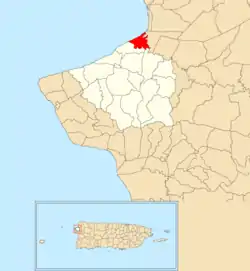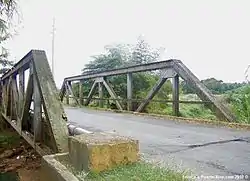Espinar, Aguada, Puerto Rico
Espinar is a barrio in the municipality of Aguada, Puerto Rico. Its population in 2010 was 1,281.[3][4][5]
Espinar | |
|---|---|
Barrio | |
 Location of Espinar within the municipality of Aguada shown in red | |
 Espinar Location of Puerto Rico | |
| Coordinates: 18°24′28″N 67°09′46″W[1] | |
| Commonwealth | |
| Municipality | |
| Area | |
| • Total | 1.23 sq mi (3.2 km2) |
| • Land | 0.86 sq mi (2.2 km2) |
| • Water | 0.37 sq mi (1.0 km2) |
| Elevation | 0 ft (0 m) |
| Population (2010) | |
| • Total | 1,281 |
| • Density | 1,489.5/sq mi (575.1/km2) |
| Source: 2010 Census | |
| Time zone | UTC−4 (AST) |
History
Espinar is located near the Culebrinas River and is named after a Franciscan priest who founded a convent there. In 1529, Espinar and other priests were assassinated by the indigenous Island Caribs. Their deaths resulted in a hermitage being built for honoring their martyrdom. Later on, Franciscan priests erected a new church over the ruins of the first and, to this day, religious services are held there.[6][7]
Puerto Rico was ceded by Spain in the aftermath of the Spanish–American War under the terms of the Treaty of Paris of 1898 and became a territory of the United States. In 1899, the United States conducted its first census of Puerto Rico finding that the population of Espinar and Carrizal barrios was 1,010.[8]
Puente de Coloso

The Puente de Coloso, a bridge used during the height of sugarcane production in Puerto Rico is located near Espinar.
| Historical population | |||
|---|---|---|---|
| Census | Pop. | %± | |
| 1980 | 1,587 | — | |
| 1990 | 1,378 | −13.2% | |
| 2000 | 1,569 | 13.9% | |
| 2010 | 1,281 | −18.4% | |
| U.S. Decennial Census[9] 1899 (shown as 1900)[10] 1910-1930[11] 1930-1950[12] 1980-2000[13] 2010[14] | |||
Sectors
Barrios (which are like minor civil divisions)[15] in turn are further subdivided into smaller local populated place areas/units called sectores (sectors in English). The types of sectores may vary, from normally sector to urbanización to reparto to barriada to residencial, among others.[16][17][18][19][20]
The following sectors are in Espinar barrio:[21]
Brisas de Espinar (Solares), Parcelas Pastos Comunales, Sector El Caracol, Sector Hernández Ramírez, Sector Hoyo Frío, Sector La Playa, Sector Marcial, and Sector Río Culebrinas.
References
- "US Gazetteer 2019". US Census. US Government.
- U.S. Geological Survey Geographic Names Information System: Espinar Barrio
- Picó, Rafael; Buitrago de Santiago, Zayda; Berrios, Hector H. Nueva geografía de Puerto Rico: física, económica, y social, por Rafael Picó. Con la colaboración de Zayda Buitrago de Santiago y Héctor H. Berrios. San Juan Editorial Universitaria, Universidad de Puerto Rico,1969.
- Gwillim Law (20 May 2015). Administrative Subdivisions of Countries: A Comprehensive World Reference, 1900 through 1998. McFarland. p. 300. ISBN 978-1-4766-0447-3. Retrieved 25 December 2018.
- Puerto Rico:2010:population and housing unit counts.pdf (PDF). U.S. Dept. of Commerce, Economics and Statistics Administration, U.S. Census Bureau. 2010.
- "Barrios de Puerto Rico: Barrio Espinar de Aguada [The History of Puerto Rico through its Barrios: Espinar of Aguada]" (video). www.pbslearningmedia.org (in Spanish). Fundación Puertorriqueña de las Humanidades and Sistemas TV. Retrieved 2 September 2020.
- "Parroquia Inmaculada Concepción". capuchinospr.org (in Spanish). Retrieved 3 September 2020.
- Joseph Prentiss Sanger; Henry Gannett; Walter Francis Willcox (1900). Informe sobre el censo de Puerto Rico, 1899, United States. War Dept. Porto Rico Census Office (in Spanish). Imprenta del gobierno. p. 160.
- "U.S. Decennial Census". United States Census Bureau. Archived from the original on February 13, 2020. Retrieved September 21, 2017.
- "Report of the Census of Porto Rico 1899". War Department Office Director Census of Porto Rico. Archived from the original on July 16, 2017. Retrieved September 21, 2017.
- "Table 3-Population of Municipalities: 1930 1920 and 1910" (PDF). United States Census Bureau. Archived (PDF) from the original on August 17, 2017. Retrieved September 21, 2017.
- "Table 4-Area and Population of Municipalities Urban and Rural: 1930 to 1950" (PDF). United States Census Bureau. Archived (PDF) from the original on August 30, 2015. Retrieved September 21, 2014.
- "Table 2 Population and Housing Units: 1960 to 2000" (PDF). United States Census Bureau. Archived (PDF) from the original on July 24, 2017. Retrieved September 21, 2017.
- Puerto Rico:2010:population and housing unit counts.pdf (PDF). U.S. Dept. of Commerce Economics and Statistics Administration U.S. Census Bureau. 2010. Archived (PDF) from the original on 2017-02-20. Retrieved 2019-08-02.
- "US Census Barrio-Pueblo definition". factfinder.com. US Census. Archived from the original on 13 May 2017. Retrieved 5 January 2019.
- Mari Mut, José A. (28 August 2013). "Los pueblos de Puerto Rico y las iglesias de sus plazas" (in Spanish). Retrieved 19 June 2020 – via archive.org.
- "Agencia: Oficina del Coordinador General para el Financiamiento Socioeconómico y la Autogestión (Proposed 2016 Budget)". Puerto Rico Budgets (in Spanish). Retrieved 28 June 2019.
- Rivera Quintero, Marcia (2014), El vuelo de la esperanza : Proyecto de las Comunidades Especiales Puerto Rico, 1997-2004 (Primera edición ed.), San Juan, Puerto Rico Fundación Sila M. Calderón, ISBN 978-0-9820806-1-0
- "Leyes del 2001". Lex Juris Puerto Rico (in Spanish). Retrieved 24 June 2019.
- "Comunidades Especiales de Puerto Rico" (in Spanish). 8 August 2011. Retrieved 24 June 2019.
- "DESGLOSE DE SECTORES Y CENTROS DE VOTACIÓN PRECINTO ELECTORAL - AGUADA 038" (PDF). Comisión Estatal de Elecciones Puerto Rico (in Spanish). 28 October 2019. Retrieved 15 June 2020.